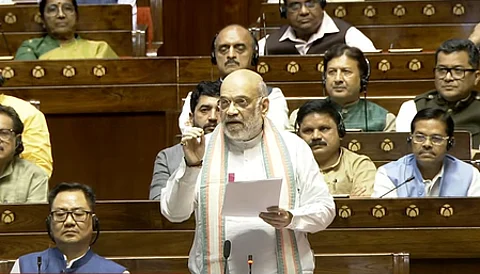

Follow TNM’s WhatsApp channel for news updates and story links.
In an address in the Rajya Sabha on Wednesday, July 30, Union Home Minister Amit Shah declared, “no Hindu can ever be a terrorist,” while launching a scathing attack on the Congress for coining the term “saffron terror” and allegedly demonising the Hindu community for vote-bank politics. The statement came as part of a broader rebuttal during the debate on Operation Sindoor and Operation Mahadev, where Shah accused the Congress of weakening India’s internal security and enabling terrorism through decades of appeasement politics.
Shah said the UPA-era narrative around “hindu terror” was politically motivated and claimed that innocent people were jailed to build a false narrative. He referred to the 26/11 Mumbai attacks, carried out by Pakistan-based Lashkar-e-Taiba, and said attempts were made to shift the blame to Hindutva groups. He named Congress leader Digvijaya Singh as one of those who promoted this theory, and referred to a leaked diplomatic cable where a Congress leader reportedly expressed more concern about “Hindu terror” than Pakistan-backed terrorism.
He also brought up the 2008 Batla House encounter, accusing the Congress of undermining the security forces by questioning their actions. “When police officer Mohan Sharma was killed in the Batla House encounter, Sonia Gandhi wept for the shooters,” he said.
Shah criticised the Congress for allowing separatist groups like Jamaat-e-Islami and Hurriyat to operate in Kashmir, stating that their activities were tolerated in the name of vote-bank politics. “Congress never banned these groups. Instead, it allowed them to flourish,” he said.
He credited the Modi government with dismantling what he described as the "terror ecosystem" in Jammu and Kashmir, especially after the revocation of Article 370 and Article 35A on August 5, 2019. According to Shah, this move removed both legal provisions and the political mindset that allowed terrorism to grow.
He presented statistics to claim that terrorism in Kashmir is at its lowest point in decades. Shah said that while there were 2,564 incidents of organised stone-pelting in 2010, not a single such incident had been reported since 2024. Civilian deaths have dropped from 1,717 (2004–2014) to 357 (2015–2025), and the number of security personnel killed has halved from 1,060 to 542 in the same period. He also said that no local youth in Kashmir had joined terrorist ranks in the last six months and that all remaining active militants were foreigners, mostly Pakistanis.
On development, Shah cited infrastructure projects like the Chenab Bridge, the Zojila and Banihal tunnels, and the Udhampur-Baramulla railway line. He also noted the setting up of institutions like IIT, IIM and AIIMS in the region.
Shah also responded to recent criticism from the Congress regarding the government’s handling of the April 22 Pahalgam terror attack, where 26 tourists were killed. He said that three Lashkar commanders responsible, Suleimani, Afghan and Jibran, were killed in Operation Mahadev. Other operatives, including Hafiz Muhammad, Mudassar, and Mohammed Hamza, were neutralised in Operation Sindoor.
He criticised former Home Minister P Chidambaram for demanding proof that the terrorists killed in these operations were Pakistanis. “Why does Chidambaram need proof? Who is he trying to protect, Pakistan or Lashkar?” he said.
Shah dismissed claims that the timing of Operation Mahadev was politically motivated to coincide with the Parliament session. He also rejected Chidambaram’s view that Operation Sindoor was not decisive, asking, “Were 1965 and 1971 decisive? Then why did terrorism continue under Congress governments?”
Shah concluded by saying that the Modi government’s response to terrorism has been direct and forceful, and that talks with Pakistan will not resume until cross-border terrorism ends.
(With inputs from IANS)